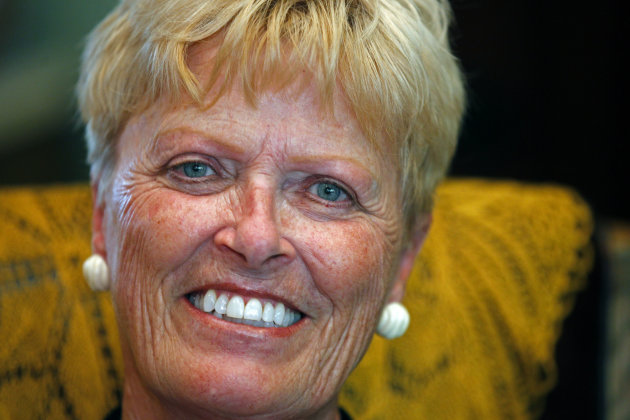
North Carolina's population has nearly doubled since 1970, fueled by an economic expansion that brought an influx of Midwesterners, Northeasterners and nonwhites and turning the state from a repugican presidential stronghold into a battleground.
Among the new residents: Carol Fentiman, 66, a Chicago native who retired with her husband to the western Carolina mountains seven years ago from California and is a Democratic Party volunteer. And Piper Phillips, 18, a college student who moved here a year ago from Ohio and who will cast her first presidential ballot this year for Barack Obama.
To
explain their upcoming votes, both cited women's health care and
abortion rights, civil rights for gay Americans and equal pay for women.
"I'd like to be considered an equal citizen in this country," Fentiman said.
On
the strength of young voters, African-Americans and urban voters — many
of them born elsewhere — Obama won North Carolina in 2008 by 14,177
votes out of 4.3 million. He was the first Democrat to prevail here
since Georgia's
Jimmy Carter managed a Southern sweep in 1976. Democrats chose
Charlotte for their 2012 nominating convention, and polls suggest
another thin margin between the president and repugican challenger Mitt Romney.
Obama's win surprised many of the state's political players.Advantages from a younger, less native, less white, more urban electorate weren't expected to level the field for Democrats so soon, but Obama employed an extensive ground game that, four years later, still operates more than 50 field offices. Those outposts use volunteers like Fentiman to register tens of thousands of new voters like Phillips.
"Obama sped up the clock," said Ferrel Guillory,
a University of North Carolina expert on Southern politics. Guillory
said the winning threshold for Democrats had been 40 percent of the
white vote statewide. "Obama proved you could win with 36 or 37
percent," he said.
North Carolina's growth is due to economic
diversification that distinguished the state from its Southern
neighbors. An agrarian and manufacturing economy dominated by tobacco,
furniture and textiles gave way to banking centers in Charlotte, myriad
health care enterprises and the biomedical and technology firms in the
Research Triangle of Raleigh, Durham and Chapel Hill. Much of it is
connected to a network of well-regarded public and private universities.
Not
all the newcomers are Democrats. Eastern coastal areas that attract
some retirees have been reliably repugican in recent federal elections.
Mid-career professionals span the spectrum. Independents compose the
largest crop of new registrants.
Many native white North
Carolinians like Greenville's Lebern Rouse Jr., meanwhile, have
abandoned their old Democratic loyalties as a vestige of the once "Solid
South." Rouse, 65, recalled that his father "always heard that
Democrats were for the small, working man and repugicans were for
richer people." But, he added: "As time went by I rejected that, and so
did he."What has emerged is a genuine swing state, even if one where long-standing inconsistencies and quirks are still at play.
For decades, as repugicans won the presidential vote, North Carolinians left Democrats in charge at the Statehouse. A state that chose notable progressive governors Terry Sanford and Jim Hunt sent the firebrand cwingnut Jesse Helms to the U.S. Senate for 30 years.
"I guess we are just a bit schizophrenic," said Richard Vinroot, a repugican and former Charlotte mayor who lost a close governor's race to Democrat Mike Easley in 2000.
Now,
as Obama brings Democratic advantages to a head at the top of the
ticket, repugicans are engineering a down-ballot takeover. In 2010, the repugican cabal captured legislative majorities in both chambers for the first time
since Reconstruction. Social neanderthals won a victory in May when
voters easily approved a constitutional ban on same-sex marriage.
Vinroot's
successor in Charlotte, repugican Pat McCrory, is favored to win an
open governor's seat in November. Democratic Gov. Beverly Perdue opted
not to seek a second term. The party also is set to pick up as many as
four congressional seats in Democratic districts that repugican
legislators redrew to repugican advantage.
Gary
Pearce, a Democrat who worked for Hunt, argued that North Carolina's
fundamentals haven't necessarily changed. "There have always been what I
call the two tribes," he said, referring to the "progressive tradition"
anchored by the universities and cities and "the more lunatic,
more racist strain" in the rural counties that propelled Helms. The
difference, Pearce said, is that divisions have hardened.
Vinroot,
the Charlotte repugican, agreed and said that reduces the pool of
potential ticket splitters, voters that Vinroot described as resenting
an active federal government but who "still wanted state government to
do all those things."
Rufus
Edmisten, a former Democratic attorney general and secretary of state,
called it the "nationalization of North Carolina politics. There's just a
clear distinction about which party is which, now. It's hard to find a
self-described conservative who is a Democrat anymore."
Guillory,
the UNC expert, said that means North Carolina elections, including
Obama vs. Romney "will turn even more on the ground game, on getting
your loyalists to the polls."

No comments:
Post a Comment